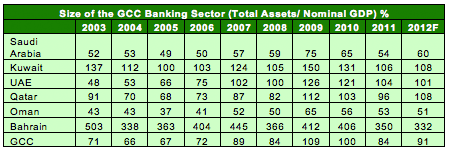Just as the Gulf banking sector was recovering from the shocks of the 2008 crisis, the Eurozone fiasco has dented prospects for the regional sector.
This time, however, the Gulf banks are better prepared.
"After two consecutive years of declining bottom-line figures, the GCC banking sector resumed its trajectory of expanding profits in 2010/2011," notes Kuwait Financial Centre, or Markaz, in a new report. "The catalyst for this growth is declining provisions after the spikes witnessed in 2008/2009 as a result of the global financial crisis."
The regional banking sector saw revenues grow by a strong 10% and growth appears to have resumed, although it's pegged back by loans and deposits weakness. Only Qatar and Omani banks have clocked double-digit loans and deposit growth, while the rest of the GCC has to be contend with high single-digit growth.
"The debt issues which caused a spike in provisioning are by no means history; however, muted private demand and rising NPLs remain sources of concern going forward," said M.R. Raghu, Vice-President, Research at Kuwait Financial Centre.
The senior economist expects provisioning to come down by 2% in 2011 and fall further this year, due to 'abundant' provisions built up in 2009 and 2010.
"In the UAE and Kuwait, provisions are expected to remain above 1% of loans. Overall, following the bottom-line growth rates of 9% and 16% in 2010 and 2011 respectively, we expect a surge of 19% in 2012."
M.R. Raghu, Vice-President, Research at Kuwait Financial Centre spoke to alifarabia.com on the challenges facing the Gulf banking sector, especially as the crisis in the Eurozone threatens to infect the Gulf economies and chokes regional financial markets.
Q. Do you think Gulf banks will struggle if the situation in the EU deteriorates?
A. Gulf banks are bound to be negatively impacted by a worsening in the EU situation although they may not 'struggle'. The negative impact is largely attributable to lower economic growth and a subsequent cut in oil prices.
Apart from this, GCC will feel the impact of European bank deleveraging given that large European banks are active participants in the region's project financing market. As liquidity dries up, debt refinancing will be tough especially for troubled GREs.
IMF had estimated GREs in the UAE to have about USD30-billion of debt maturing this year. The fact that UAE's loans-to-deposits ratio has consistently been lower (96%-99%) than that of Eurozone countries (110%) will ensure that UAE banks don't 'struggle'.
Q. Has the EU crisis helped domestic banks in relation to their competitiveness against international banks, which are distracted and selling off non-core assets. Do you expect to see M&A opportunities in the region?
A. The impact of any crisis can be assessed only in retrospect. One study has found that the performance of Gulf banks as measured by overall technical efficiency has remained relatively stable before, during and after the two crises (the Gulf war and the financial crisis) that occurred between 1997 and 2007.
Another study concluded that French banks with more deposit financing exhibited higher returns during the crisis.
With regard to the current EU crisis, we feel that GCC banks' competitiveness is likely to be unwavering.
If the possibility for M&A arises, well-capitalised banks will be in a good position to make use of the opportunity. GCC banks could acquire stakes in local units of distressed foreign banks; while weaker domestic banks can attract government support. Raising capital in such a market will be difficult.
Q. Which Gulf banking sector is especially vulnerable in the advent of a severe deterioration of the EU crisis, for example, if Greece leaves the E.U.?
A. Rather than looking at the impact country-wise, we would expect a worsening of the EU crisis to adversely impact conventional banks to a greater extent than they would Islamic banks.
Since Islamic banks do not permit the use of derivatives and the instruments are rather straight forward, the possibility for leverage and hence excessive risk exposure is diminished and a consequent domino effect affecting the entire system is unlikely to materialize.
UAE banks with high NPL [non-performing loan] ratios that were hit in the 2008-09 crises appear more susceptible.
Q. Do you think that Gulf corporations which are looking to fund their mega projects will struggle to find financing if the EU crisis worsens. How would that impact the banking sector?
A. Yes, obtaining capital is going to be a great challenge as liquidity dries up. Greater support from the Government will help companies finance projects. GCC banks are likely to face a higher demand for corporate loans this year as liquidity in the capital markets tightens.
Q. Apart from the EU, what are the other Gulf banks' challenges you think are important to keep an eye on.
A. Firstly, banks shouldn't fall into the trap of risk aversion leading to credit contraction as a consequence of crisis periods. The core business of banking (i.e, lending) cannot remain muted for a long time as it will have economic consequences as well.
Secondly, a ban on Islamic financing operations by conventional banks can severely constrain growth and inhibit innovation in the market.
Thirdly, drafting and implementing a good banking governance system is essential for the sector to flourish. The GCC banks should better comply with corporate governance standards.
© alifarabia.com 2012




















